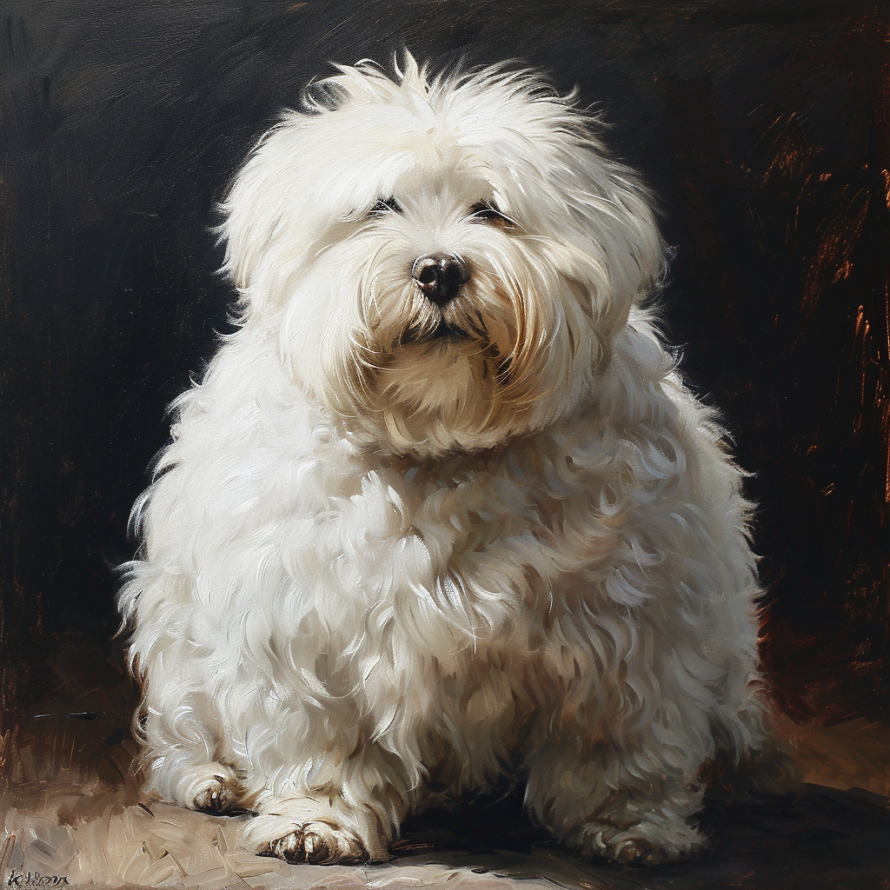Dog Obesity:
Is your dog in danger of canine obesity health issues?
Is the Coton de Tulear prone to dog Obesity?
 AI rendering
AI renderingOne of the traits the Coton de Tulear is known for is their penchant to beg for food. And how can we resist that cute little ball of cotton when they're dancing on their hind legs, looking so cute staring at your lunch? Does this sound familiar?
I have been guilty of this myself. Now I keep a bag of veggies nearby so when my dog is giving me that look I can feel good about giving a healthy treat. It really is in their best interest not to give in to their pleading eyes.
My dog, Lucy, put on weight due to her anti-seizure medication. While the drugs are helping with the seizures, the added weight has caused back pain and mobility issues. She has to go to physical therapy, and we’re working on helping her lose weight.
How do you know if your dog is overweight, and why is it important to know:
It's important to determine if your dog is overweight because, just like us humans, canine obesity can lead to all kinds of health issues, such as osteoarthritis, high blood pressure, diabetes, cancer, back issues, and heart disease. Making sure your dog is the proper weight for his size can add years to his life. Signs that your dog needs to downsize include:
- You can’t feel his ribs
- His stomach is saggy, and you can grab fistfuls of fat
- He has to exert himself to do a normal amount of exercise (walking up stairs, going for a walk, etc).
What causes dog obesity?
Some of the more common causes of dog obesity include:
- Living a sedentary lifestyle with very limited exercise
- Bad habits of owners who feed table scraps, high fat processed dog food and treats, and provide unlimited access to food for their dogs. Many dogs will literally eat until they get sick, so it's up to us to provide the proper amount of food.
- Health conditions such as arthritis or hip dysplasia limit the amount of exercise a dog can have, which affects their weight as a result.
- Medications such as Phenobarbital, Prednisone, and certain anti-anxiety drugs
- Metabolic disorders such as hypothyroidism.
- Getting older. Senior dog care should focus on proper nutrition and exercise.
What's the best way to treat or prevent dog obesity?
Well, just as with humans, there's no magic bullet for losing weight. We ALL have to do it the same way:
- Increase exercise - this can be as simple as adding an additional walk or two throughout the day or tossing a frisbee around for a while. The good thing is that most dogs don't have an aversion to exercise the way many of us humans do. They love any opportunity to play with us.
- Provide healthy training rewards. If you use food as training rewards, make sure the food is healthy and keep the portion size very small. Carrots and apple slices work really well.
- Avoid high-calorie treats. Do not give in to those pleading guilt-provoking doggy looks when they're begging for food. Just remember that saying no can add years and a better quality of life to your dog. Giving high-calorie treats defeats the purpose of putting your dog on a low-calorie diet.
- Have a plan. Make sure everyone in the family complies with your dog's diet plan. Are your spouse and kids sneaking treats to your dog?
- Provide high-quality foods that are lower in fat content, higher in fiber, and have reduced calories, but supply all the protein, vitamins, and minerals necessary for good health.
- Sometimes, a change in food is not necessary; just a reduction in the amount of your dog's usual food may be enough to reduce weight. It's kind of like humans; one cookie won't hurt us, but if you eat the whole bag, you can expect to see it reflected on the scale. Be careful you don't reduce too much or you might not be giving your dog sufficient nutrients.
It's always best to work with your veterinarian to come up with the right weight reduction plan for your dog.
How many calories does your dog need?
This depends on the type of breed, age, size, and activity level of your dog.
You can calculate calories here or contact your vet to determine the requirements for your dog.
According to the Association for Pet Obesity Prevention, an estimated 89 million US dogs and cats are overweight or obese. Don’t let your dog become part of these statistics. Work with your vet to ensure you have the perfect plan to give your dog the highest quality longest life possible.
Home | About Me | Contact Me | Privacy Policy |Disclosure
Copyright© 2008- All Rights Reserved







